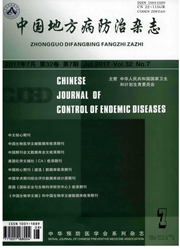

 中文摘要:
中文摘要:
目的观察不同剂量的碘酸钾和碘化钾对大鼠腹主动脉SR-B1蛋白表达的影响。方法根据喂养碘剂和剂量不同将Wistar大鼠随机分为适碘组(KI、KIO3),10倍高碘组(10KI、10KIO3)、50倍高碘组(50KI、50KIO3),100倍高碘组(100KI、100KIO3)。喂养半年后,利用免疫蛋白印迹分析(Western-blot)检测大鼠腹主动脉中SR-B1蛋白表达水平。结果大鼠腹主动脉重量无组间统计学差异(P〉0.05);大鼠动脉SR-B1蛋白水平在适碘组之间无差异(P〉0.05),而在高剂量的碘酸钾组中,SR-B1蛋白水平均低于等剂量的碘化钾组(P〈0.05);SR-B1的蛋白表达水平随着碘酸钾喂养剂量的增加而下降,但在不同剂量碘化钾组中无明显变化趋势。结论与碘化钾相比,高剂量的碘酸钾抑制了大鼠动脉SR-B1蛋白表达水平。
 英文摘要:
英文摘要:
Objective To observe the effect of potassium iodate and potassium iodide on the SR - B1 protein expression of abdominal aorta in rats. Methods The SPF wistar rats were randomly divided into 8 groups, normal iodide groups ( KI, KIO3), 10 fold iodide groups ( IOKI, IOKIO3), 50 fold iodide groups (50KI, 50KIO3) and 100 fold iodide groups ( IOOKI, IOOKIO3). After 6 months treatment, the SR - B1 protein levels in abdominal aorta were determined by western - blot analysis. Results The weights of rat abdominal aorta showed no statistically significant change among 8 groups ( P 〉 0. 05) ; The SR - B1 protein expression displayed no remarkable difference between the group of KI and KIO3( P 〉 0.05). But the protein level of SR- B1 in high dose groups of potassium iodate ( 10KIO3, 50KIO3 and 100KIO3) were higher than those in isodose groups of potassium iodide, (10KI, 50KI and 100KI) ( P 〈0.05); The SR- B1 protein level decreased with the increase of potassium iodate feeding dosage, but there was no apparent trend among the groups of potassium iodide. Conclusion Compared with potassium iodide, high dose potassium iodate can depress the SR - B1 protein expression of rat abdominal aorta.
 同期刊论文项目
同期刊论文项目
 同项目期刊论文
同项目期刊论文
 期刊信息
期刊信息
